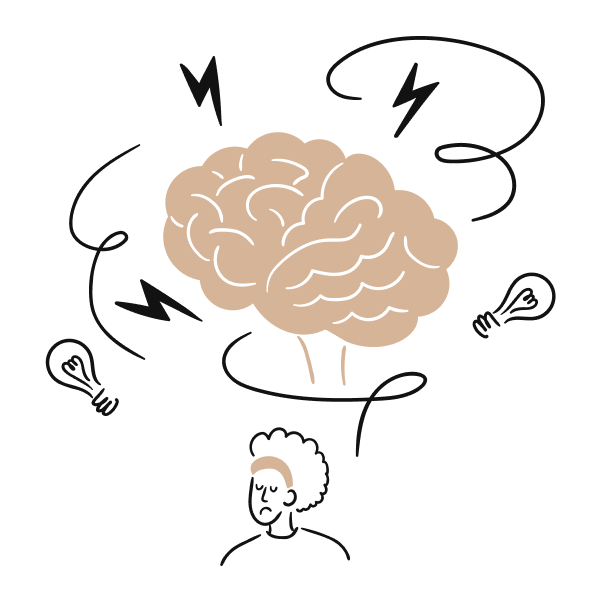Going to a crowded concert or enjoying an evening at the movies? You’d rather stay home. When you suffer from agoraphobia, you find places with many people or situations where you can’t leave immediately frightening. Learn more about agoraphobia; its symptoms, causes, tips for yourself and treatment.
What is agoraphobia?
Agoraphobia is an anxiety disorder. If you have agoraphobia, you experience overwhelming fear when you enter public places, such as city squares, crowded stores or buses and trains.
What are the symptoms of agoraphobia?
How do I know if I am experiencing agoraphobia?
If you have agoraphobia, you often been always afraid of at least two of the following situations for more than six months:
- Traveling by car or public transportation (bus, train, boat or plane);
- Being in an open place, such as a plaza, parking lot or bridge;
- Being in an enclosed place, such as a store, theater, movie theater or meeting room;
- Standing in line or a crowd, such as a line for the checkout at the supermarket or a crowd at the mall;
- Leaving your home alone. You no longer go outside or only with someone else.
Symptoms of agoraphobia
There is a distinction between general symptoms of agoraphobia and the symptoms you experience at the moment you feel anxious.
General symptoms of agoraphobia, are:
- Fear of going into public places, or into places that are difficult to get out of;
- You like to stay at home, in your familiar place.
Symptoms in the moment of fear:
- Wanting to leave the place as soon as possible;
- Having the feeling of losing control;
- A strong feeling of tension;
- A feeling of helplessness;
- Physical sensations, such as pressure on your chest, tightness in the chest, shortness of breath and heart palpitations.
What causes agoraphobia?
Agoraphobia does not have a single identifiable cause. There are several factors that can contribute to the development of this disorder, including:
- Genetics: If one or both of your parents has agoraphobia, you are more likely to get it too.
- Panic attacks: A previously experienced panic attack in a public place, may be a reason you develop agoraphobia. This is because a panic attack is an intense experience, where, for example, you experience heart palpitations, start to sweat excessively, get dizzy and feel stuffy. Such an attack has a lot of impact on you. Sometimes so much that you become afraid of having another panic attack in a similar situation. As a result, you avoid that situation or place in the future.
- Major life event: This can be either a negative event (illness, death, divorce, moving, resignation) or a positive event (birth of child, promotion).
What is the difference between agoraphobia and a panic disorder?
Effects of agoraphobia?
Agoraphobia often has significant consequences. Because you avoid many situations and are afraid to face the fear, you can become lonely. In fact, many people with agoraphobia prefer to stay at home and don’t get out much. This also increases the risk of depression. After all, your world gets smaller and smaller. Avoidance behavior perpetuates anxiety. Eventually, this can also make you feel hopeless.
What can you do for yourself?
When you suffer from agoraphobia, you can help yourself by expressing how you feel. Discuss what is going on in you with someone you trust and/or seek help from a psychologist. Agoraphobia is generally treatable with cognitive behavioral therapy (CBT).
Tips for myself – I am experiencing agoraphobia
Are you experiencing symptoms of agoraphobia? There are a number of things you can try with or without the help of a psychologist:
- Face the fearful situation, no matter how difficult it may be. Avoiding the situation may seem to be the solution in the short term, in the long term it leads to negative consequences.
- Take a look at the situations you find scary. Make a list of them and number them from “least scary” to “most scary. Then ask yourself what makes you find these situations so scary. What is the worst thing that could happen?
- Learn breathing techniques that you can use in the moment you are anxious. These can relieve anxiety and panic feelings the moment they rear their heads.
- Listen to podcasts or read about agoraphobia and learn more about the disorder. Understanding how your anxiety works can be reassuring and also motivating.
Tips for my loved ones – and me
Tips for a partner or loved one of someone with agoraphobia:
- Offer a listening ear so the other person has an opportunity to talk about his or her fears and feelings.
- Try to encourage the person with agoraphobia to go outside and face fearful situations anyway. It is important that you do this from an encouraging position, not coercive.
- Try to challenge their thoughts, asking what causes someone to be so afraid. What is someone expecting? And what is the worst thing that could happen? Also ask what you can do that will make him or her dare to face the situation anyway.
- Encourage your loved one to seek psychological help when the fear is so big that it affects their daily life.
- Support treatment by continuing to encourage your loved one or partner with agoraphobia to exercise. This is because the more often he or she exposes himself or herself to the fearful situation, the more the anxiety will decrease over time.
Treating agoraphobia
Agoraphobia is well treatable with therapy.
- Cognitive behavioral therapy (CBT) is the form of therapy most commonly used. This treatment focuses on examining and breaking certain negative thought patterns and changing behaviors.
- Exposure in vivo is highly effective behavioral therapy regularly used for agoraphobia. This involves exposing you to the situations in which you become anxious, challenging the fear. Furthermore, relaxation exercises can help if you suffer from agoraphobia.
The goal of treatment is that you no longer have to avoid situations that were previously too frightening for you. You learn to deal with your fears.
Help with agoraphobia
Do you have questions about agoraphobia? Or do you have doubts about when to consult a psychologist?
-
Have you tried many things yourself and still experiencing symptoms? Feel free to call us at 085-1308900 or contact us online. This way you can feel if there is a click and if you feel comfortable.
-
At iPractice, you will work with 2 psychologists. Treatment consists of both online contact and regular consultation room sessions at one of iPractice’s locations. Or find more information about the intake and treatment process at iPractice.
-
Cognitive behavioral therapy (CBT) is the first choice of treatment for agoraphobia. Specifically, this involves Exposure therapy. A treatment with us lasts on average 4 to 6 months.
-
With a referral letter from the general practitioner and an official diagnosis of agoraphobia according to DSM-5 guidelines, almost every insurer will reimburse the cost. See which health insurance companies reimburse our care.
FAQ
In the case of generalized anxiety disorder, you worry a lot. You can be anxious and/or worried about all sorts of things, this is not necessarily location dependent in generalized anxiety disorder as it is in agoraphobia.
If you have social anxiety, you have a fear of critical judgment by others. Dreaded social situations you prefer to avoid. Just as you would probably avoid crowded parties if you have agoraphobia. Only the reason is different. With agoraphobia, the crowds oppress you and the feeling that you can’t just leave. With social phobia, it’s specifically the other people who cause the anxiety in you because you’re afraid of their judgment or reaction.
Sources:
[1] Nederlandse vereniging voor Psychiatrie – Folder angststoornis en agorafobie


 Nederlands
Nederlands




